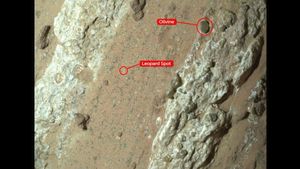The U.S. Senate has made significant moves this January by confirming several key figures for top Cabinet positions in President Donald Trump's administration. Among the latest confirmations is the appointment of former North Dakota Governor Doug Burgum as Secretary of the Interior. The Senate voted overwhelmingly to confirm him, with the final tally at 79-18, drawing bipartisan support including endorsements from North Dakota’s Sens. John Hoeven and Kevin Cramer, who praised Burgum's commitment to U.S. energy production.
During his confirmation hearing, Burgum emphasized the importance of enhancing the nation’s energy policies and restoring the management of public lands to support various stakeholders. He stated, “Serving as Interior Secretary presents the opportunity to redefine our government’s relationship with tribal nations and landowners, focusing on maximizing responsible use of our natural resources.” With the Department of the Interior overseeing 70,000 employees and managing approximately 11 agencies, including the National Park Service and the U.S. Geological Survey, Burgum's role will be pivotal in shaping the future of America's natural resources.
Another confirmation this month came with Kristi Noem being appointed as Secretary of Homeland Security. Her bipartisan confirmation by a vote of 59-34 places her at the forefront of Trump’s immigration agenda. Noem, the former governor of South Dakota, has expressed her unwavering commitment to securing the southern border and reforming the immigration system during her confirmation hearing.
“I will work every day to keep all Americans safe and secure. One of my top priorities is achieving President Trump’s mandate from the American people to secure our southern border,” Noem declared. Her position oversees various agencies, including Customs and Border Protection and Immigration and Customs Enforcement, both central to carrying out Trump's promises on immigration enforcement.
Noem’s rise to national prominence was bolstered by her actions during the COVID-19 pandemic, where she rejected mask mandates, enhancing her reputation among conservative circles. Nonetheless, she faced controversy following revelations of her past actions concerning animal euthanasia. This nuanced blend of admiration and scrutiny will likely follow her as she steps onto the national stage.
Sean Duffy was also confirmed as the Secretary of Transportation amid rising concerns around transportation safety and infrastructure. Duffy, who served as a congressman from Wisconsin, received confirmation with wide support, voting 77-22. President Trump envisions Duffy leading the charge on significant infrastructure improvements, emphasizing the need for reduced regulations on construction projects and improved traffic safety.
“It is time to rebuild our infrastructure and to restore public confidence,” Duffy stated after confirmation. He brings experience from his eight years in Congress, which Trump hopes will facilitate new legislative initiatives and collaborations.
Although these appointments are considered triumphs for the Trump Administration, they are not without challenges. Burgum’s potential conflicts of interest, stemming from his previous financial ties to the energy industry, have raised eyebrows. A review by North Dakota Monitor revealed instances where Burgum voted on issues tied to his financial interests, sparking conversations about ethical governance. To counter these concerns, Burgum has pledged to divest from oil and gas leases and energy stocks.
Meanwhile, Noem’s confirmation puts her front and center amid America's contentious immigration debate. Her swift action on immigration enforcement has already begun, with reports of ICE operations taking place shortly after her appointment. Advocates and local officials have expressed concern about how her policies may clash with existing state regulations, particularly those limiting cooperation with federal immigration enforcement.
Trump's Cabinet changes signal his administration's focus on strong immigration enforcement, energy production, and infrastructure renewal—all fundamental aspects of his governance philosophy. Political analysts interpret these confirmations as strategic moves to consolidate support from conservative constituents, particularly amid increasing challenges from both political rivals and controversies surrounding executive actions.
These leaders now hold significant influence over policy directions affecting millions of Americans, and their performances will be closely monitored as they undertake their new responsibilities. The effectiveness of Burgum’s energy strategies, Noem’s approach to immigration reform, and Duffy’s infrastructure initiatives will undoubtedly play central roles in shaping the remainder of Trump's term.
Overall, with each Cabinet member's history and approach, the Trump administration is poised to continue implementing its policies with renewed vigor, but will they be able to navigate the challenges inherent within their respective roles? Only time will tell as these leaders take charge of pivotal departments. Watching their actions could provide insights on the administration's future impact on American life.



